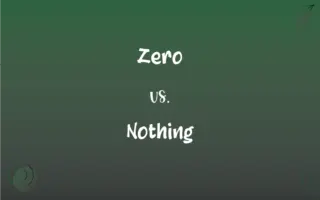Table of Contents vs. Index: What's the Difference?
Edited by Aimie Carlson || By Janet White || Updated on October 31, 2023
Table of Contents outlines chapters or sections whereas, index lists topics or keywords alphabetically.

Key Differences
The Table of Contents is a structured list usually found at the beginning of a document, detailing the chapters or sections, whereas the Index is a list located at the end, categorizing topics or keywords found throughout the document.
The Table of Contents is essential for understanding the document's layout, providing a sequential roadmap, while the Index serves as a detailed directory for specific information, allowing rapid access to precise pages.
A Table of Contents typically mirrors the document's flow, displaying the hierarchy and order of content, contrasting the Index, which disregards order in favor of an alphabetical arrangement, focusing on specific terms or ideas.
The creation of a Table of Contents happens during the initial stages of document design, ensuring a logical structure, whereas an Index is usually one of the final elements to be added, after the content is finalized.
Utilizing a Table of Contents, readers can grasp the overarching structure and themes at a glance, while an Index empowers readers to locate specific information quickly, without needing to peruse irrelevant sections.
ADVERTISEMENT
Comparison Chart
Position in Document
Usually at the beginning
Usually at the end
Purpose
Shows structure and order
Facilitates quick access to specific content
Organization
Sequential, hierarchical
Alphabetical
Time of Creation
During initial stages of document design
After content is finalized
Use
Understanding document's layout and themes
Locating specific information rapidly
ADVERTISEMENT
Table of Contents and Index Definitions
Table of Contents
A listing of a document's components in the order they appear.
The report began with an informative Table of Contents.
Index
An alphabetical list of names, subjects, etc., with references.
He found the topic quickly using the book's Index.
Table of Contents
A summary of topics covered in a book or document.
The Table of Contents outlined all the topics discussed in the conference proceedings.
Index
A directory of terms in a document with page numbers.
The detailed Index made researching with the extensive history book a breeze.
Table of Contents
An ordered list of headings and corresponding page numbers.
She referred to the Table of Contents to find the chapter.
Index
A guide listing specific topics found in a publication.
She turned to the Index to locate discussions on Byzantine art.
Table of Contents
A roadmap of a document's sections or chapters.
The Table of Contents revealed the book's comprehensive structure.
Index
An alphabetized list of names, places, and subjects treated in a printed work, giving the page or pages on which each item is mentioned.
Table of Contents
A guide to the sequential layout of a publication.
Without a Table of Contents, navigating the manual would be challenging.
Index
A thumb index.
Index
A table, file, or catalog.
Index
(Computers) A list of keywords associated with a record or document, used especially as an aid in searching for information.
Index
Something that reveals or indicates; a sign
"Her face ... was a fair index to her disposition" (Samuel Butler).
Index
A character (☞) used in printing to call attention to a particular paragraph or section. Also called hand.
Index
An indicator or pointer, as on a scientific instrument.
Index
(Mathematics) A number or symbol, often written as a subscript or superscript to a mathematical expression, that indicates an operation to be performed, an ordering relation, or a use of the associated expression.
Index
A number derived from a formula, used to characterize a set of data.
Index
A statistical value that represents the price or value of an aggregate of goods, services, wages, or other measurable quantities in comparison with a reference number for a previous period of time.
Index
A number that represents the change in price or value of stocks or other securities in a particular market, sector, or asset class.
Index
The stocks or other securities represented by an index.
Index
Index Roman Catholic Church A list formerly published by Church authority, restricting or forbidding the reading of certain books.
Index
To furnish with an index
Index a book.
Index
To enter in an index.
Index
To indicate or signal.
Index
To adjust through indexation.
Index
An alphabetical listing of items and their location.
The index of a book lists words or expressions and the pages of the book upon which they are to be found.
Index
The index finger; the forefinger.
Index
A movable finger on a gauge, scale, etc.
Index
(typography) A symbol resembling a pointing hand, used to direct particular attention to a note or paragraph.
Index
That which points out; that which shows, indicates, manifests, or discloses.
Index
A sign; an indication; a token.
Index
(linguistics) A type of noun where the meaning of the form changes with respect to the context; e.g., 'Today's newspaper' is an indexical form since its referent will differ depending on the context. See also icon and symbol.
Index
(economics) A single number calculated from an array of prices or of quantities.
Index
(science) A number representing a property or ratio; a coefficient.
Index
(mathematics) A raised suffix indicating a power.
Index
An integer or other key indicating the location of data, e.g. within an array, vector, database table, associative array, or hash table.
Index
A data structure that improves the performance of operations on a table.
Index
(obsolete) A prologue indicating what follows.
Index
(transitive) To arrange an index for something, especially a long text.
MySQL does not index short words and common words.
Index
To inventory; to take stock.
Index
To normalise in order to account for inflation; to correct for inflation by linking to a price index in order to maintain real levels.
Index
To measure by an associated value.
Index
To be indexical for (some situation or state of affairs); to indicate.
Index
(computing) To access a value in a data container by an index.
Index
That which points out; that which shows, indicates, manifests, or discloses; as, the increasing unemployment rate is an index of how much the economy has slowed.
Tastes are the indexes of the different qualities of plants.
Index
That which guides, points out, informs, or directs; a pointer or a hand that directs to anything, as the hand of a watch, a movable finger or other form of pointer on a gauge, scale, or other graduated instrument.
Index
A table for facilitating reference to topics, names, and the like, in a book, usually giving the page on which a particular word or topic may be found; - usually alphabetical in arrangement, and printed at the end of the volume. Typically found only in non-fiction books.
Index
A prologue indicating what follows.
Index
The second finger, that next to the pollex (thumb), in the manus, or hand; the forefinger; index finger.
Index
The figure or letter which shows the power or root of a quantity; the exponent.
Index
The ratio, or formula expressing the ratio, of one dimension of a thing to another dimension; as, the vertical index of the cranium.
Index
A number providing a measure of some quantity derived by a formula, usually a form of averaging, from multiple quantities; - used mostly in economics; as, the index of leading indicators; the index of industrial production; the consumer price index. See, for example, the consumer price index.
Index
A file containing a table with the addresses of data items, arranged for rapid and convenient search for the addresses.
Index
A number which serves as a label for a data item and also represents the address of a data item within a table or array.
Index
The Index prohibitorius, a catalogue of books which are forbidden by the church to be read; also called Index of forbidden books and Index Librorum Prohibitorum.
Index
To provide with an index or table of references; to put into an index; as, to index a book, or its contents.
Index
To adjust (wages, prices, taxes, etc.) automatically so as to compensate for changes in prices, usually as measured by the consumer price index or other economic measure. Its purpose is usually to copensate for inflation.
Index
To insert (a word, name, file folder, etc.) into an index or into an indexed arrangement; as, to index a contract under its date of signing.
Index
A numerical scale used to compare variables with one another or with some reference number
Index
A number or ratio (a value on a scale of measurement) derived from a series of observed facts; can reveal relative changes as a function of time
Index
A mathematical notation indicating the number of times a quantity is multiplied by itself
Index
An alphabetical listing of names and topics along with page numbers where they are discussed
Index
The finger next to the thumb
Index
List in an index
Index
Provide with an index;
Index the book
Index
Adjust through indexation;
The government indexes wages and prices
Index
A systematic arrangement of information for easy access.
The database had an Index to expedite information retrieval.
Index
An organized list directing readers to where specific content can be found.
The textbook included an Index with key terms highlighted.
FAQs
Is the Index always alphabetical?
Typically, for ease of navigation.
Are both necessary in a book?
They serve different purposes but are both helpful.
Can the Table of Contents be detailed?
Yes, sometimes including subsections.
Can an Index include topics not in the Table of Contents?
Yes, it's more detailed, including specific terms/topics.
What's an Index useful for?
Quickly locating specific information in a document.
Does the Table of Contents reflect the document's structure?
Yes, it shows the document's sequential layout.
Is the Table of Contents mandatory?
It's standard for structured documents, but not law.
Can a Table of Contents include page numbers?
Yes, typically it does.
What types of publications use an Index?
Academic, non-fiction, reference books, etc.
Does every book have a Table of Contents?
Most structured texts do, but not all.
Can a Table of Contents change?
In drafts, yes, but it should be final in the published version.
Is a Table of Contents long?
Length varies based on the document's size/complexity.
Where is the Table of Contents located?
Usually at the beginning of a document.
Are keywords in the Index?
Yes, with corresponding page numbers.
Is an Index subjective?
It requires judgment on what's important to include.
How detailed is an Index?
It can be very detailed, depending on the document's complexity.
Can digital documents have a Table of Contents?
Yes, often interactively linked to sections.
Can an Index help with research?
Significantly, by pinpointing specific information.
Who compiles the Index?
Often a specialized index compiler or the author.
Does the Table of Contents show sections?
Yes, it outlines major sections/chapters.
About Author
Written by
Janet WhiteJanet White has been an esteemed writer and blogger for Difference Wiki. Holding a Master's degree in Science and Medical Journalism from the prestigious Boston University, she has consistently demonstrated her expertise and passion for her field. When she's not immersed in her work, Janet relishes her time exercising, delving into a good book, and cherishing moments with friends and family.
Edited by
Aimie CarlsonAimie Carlson, holding a master's degree in English literature, is a fervent English language enthusiast. She lends her writing talents to Difference Wiki, a prominent website that specializes in comparisons, offering readers insightful analyses that both captivate and inform.






































































